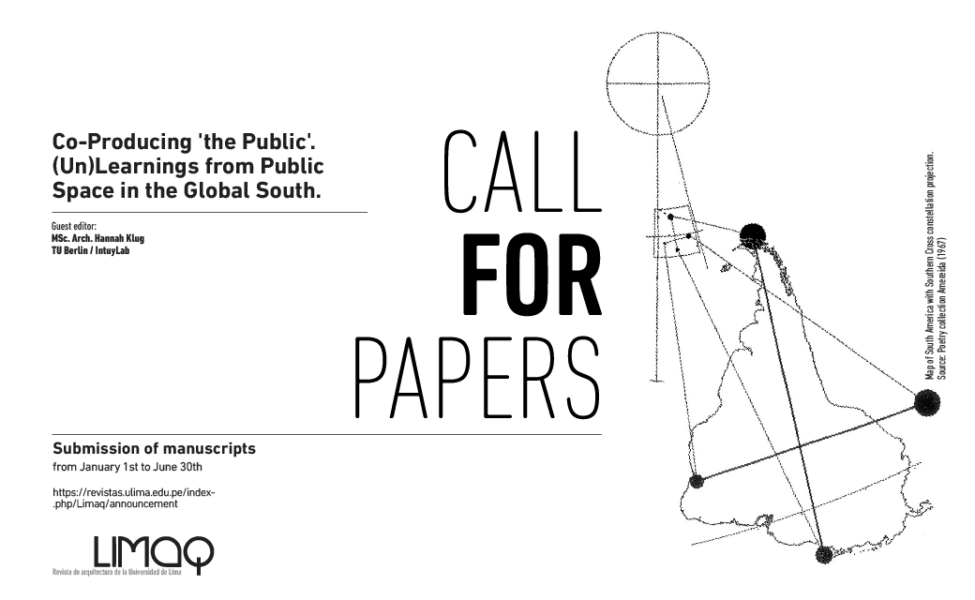CALL FOR PAPERS: “Co-Producing ‘the Public’. (Un)Learnings from Public Space in the Global South”
Limaq No. 17 – Universidad de Lima, Peru
Guest Editor: Hannah Klug
Deadline: 30th June, 2025
According to sociologist Jürgen Habermas (1990), the term “public” encompasses all expressions of human existence that hold common relevance and, consequently, are subject to processes of negotiation and social regulation. From this perspective, the public sphere is conceived as a space where meaningful encounters occur, interests are negotiated, and conflicts are managed.
Since Henri Lefebvre (1968) called for collective struggle over public spaces, this topic has gained recurrent attention both in the practice of urban planners and in academic discussions, not only in the Global North but also in the Global South, where the concept of the public is still under construction, shaped by a history of colonial domination, repression, and military and political conflicts. In this process, public spaces have played a crucial role as platforms for resistance, negotiation, and social transformation.
At the same time, urban informality, a predominant feature of cities in the Global South, plays a central role in both the construction and experience of the public sphere. While often associated with disorder and a sense of insecurity in public spaces, it also— without romanticizing it—fosters innovative dynamics. This phenomenon activates public space through community-based placemaking practices, generating spaces for collective encounters that significantly contribute to the daily formation of the public.
In this context, there is an urgent need to explore and collectively redefine the meaning of the public and public space from the perspective of the Global South. We propose recognizing public spaces as resources and platforms for collaborative learning, where society is shaped, citizenship is strengthened, critical knowledge is co-produced, and a sense of community is nurtured. These spaces help reinforce local identity, preserve collective memory, and build citizenship that balances the collective and the individual.
These processes of co-learning and co-production unfold in a constant, unpredictable, and spontaneous manner (McFarlane, 2011). However, they raise essential questions: Under what circumstances does public space become a regenerative space for collective learning? What types of knowledge are co-produced in these spaces? And which of these forms of knowledge help us redefine our understanding of public space?
This call invites us to rethink our cities, neighborhoods, and communities in the Global South as resources for collaborative learning, where multiple forms of knowledge are co-produced to guide us toward a new definition of public space. It is addressed to those working and researching urban space and the public sphere in the Global South, who are interested in participating in a collective reflection based on experience.
We are seeking research papers that examine the past to question and deconstruct the present, and that may explore the main topic through theory, design, and the investigation of spatial and everyday dynamics. We are interested in proposals that recognize and value the distinct characteristics of cities in the Global South in order to (re)write new perspectives on public space. Topics of interest include: dynamics of citizenship building; case studies on implementation and renewal; relationships with landscape and architecture; urban informality; the presence of the automobile; and more.
Link to the Announcement: https://revistas.ulima.edu.pe/index.php/Limaq/announcement
Link to the Call of Papers: https://revistas.ulima.edu.pe/index.php/Limaq/announcement/view/71
An English version of the Call for Papers can be: downloaded here.







